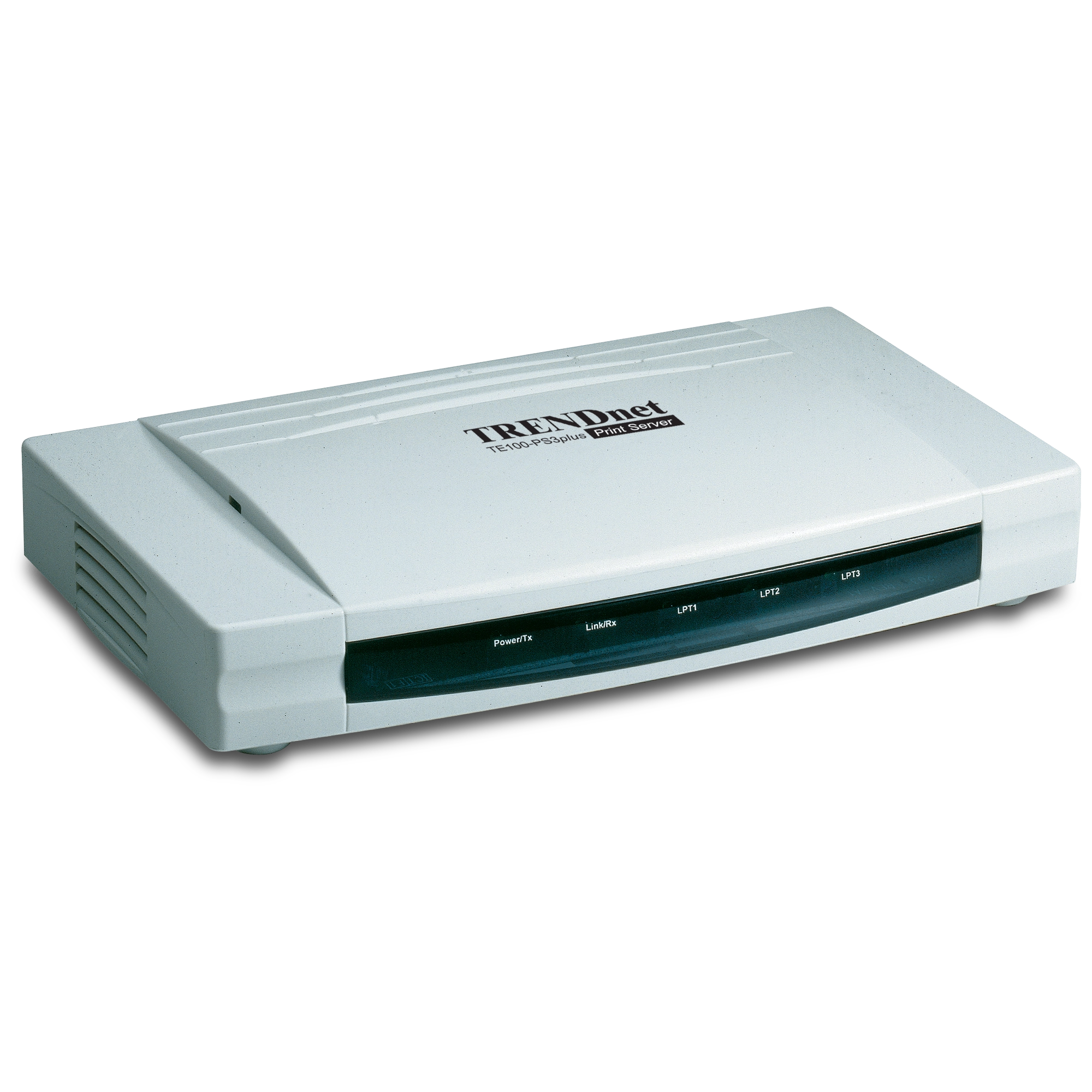10/100Mbps Multi-Protocol Fast Ethernet Print Server
TE100-PS3plus (Version 1.0)
- This multiprotocol print server transforms virtually all stand-alone printer into a shared network printer
- This small print server includes three IEEE1284-compliant high speed parallels ports
- Enjoy a 5-year warranty for peace of mind
DISCONTINUED PRODUCT
The TE100-PS3plus (Version 1.0) has been discontinued. For a list of discontinued products, click here.Utility
Win LPR utility.
Filename: WinLRP.zip
SHA-1 Checksum: 780D6CCAC407F3006E5BF3DC10184B97ACB73D3E
Date: 7/25/2017
File Size: 95.43 KB
Datasheet
Filename: Spec_TE100-PS3plus(English).pdf
Date: 3/8/2005
File Size: 186.87 KB
Filename: Spec_TE100-PS3plus(French).pdf
Date: 3/8/2005
File Size: 188.27 KB
Filename: Spec_TE100-PS3plus(German).pdf
Date: 3/8/2005
File Size: 189.79 KB
Filename: SP_Spec_TE100-PS3plus.pdf
Date: 8/2/2006
File Size: 189.25 KB
Frequently Asked Questions (FAQ)
Product Images
Make sure that you have the latest print drivers for you printer.
You can also try changing the port speed to low from with in the PS-Admin
Utility to Low.
Step 1 Click on Server Device.
Step 2 Click on the port that you have your printer plugged
into.
Step 3 Change the Speed using the ...
Print servers are IEEE1284 bi-directional compatible. This means that data
can be sent and received in both directions between the printer and the print
server.
Toner status, paper level, etc., will not be communicated back to the PC. In
order to get printer status information, the prop...
The queue name will be PS-xxxxxx-P1, x being the actual number listed in the Port Name box. It is case sensitive....
Yes, but you must assign the print server an IP address from a Windows based
operating system first. Once that is done you can use LPR or LPD printing for
the Macs and you can manage the print server by entering its IP address into
a web browser. Also the printer must be a postscript printer...
Step 1 Go to Start>Settings>Printers>Add
New Printer (WinXP - Start>Printers and Faxes>Add
a Printer).
Step 2 Select Local Printer. Make sure to uncheck Automatically
detect and install my plug and play printer. Click Next.
Step 3 Select Create a New Port and select S...
In Windows 98/Me you will need to install the LPR client.
For Windows 98/ME you will also need to know the port name that you are printing
to (The Port Name is the PS-xxxxxx-P1, x being the actual number listed in the
Port Name box).
Installing LPR:
Step 1 Once the file is downloaded ...
Step 1 Click on Server Device.
Step 2 Click on the port that you have your printer plugged into.
Step 3 Write down the Port Names for future reference.
...
Step 1 Open up the PS-Admin Utility and click on TCP IP Protocol.
Step 2Change IP Address:
In this dialog box, you can Manually Assign. When
completed, click OK.
...
If you are using Windows XP you will have to disable the built in firewall.
But for all operating systems you have to disable any other form of firewall
software such as Norton Internet Security, Black Ice, and ZoneAlarm.
Make sure that you have "Client Services for Netware" installed, it sh...
| Hardware | |
| LAN Standards: |
|
|---|---|
| LAN Port: |
|
| Printer Interface: |
|
| Network Cables: |
|
| Supported Frame Types: |
|
| Supported Protocols: |
|
| LED Indicator: |
|
| Power Consumption: |
|
| Dimensions: |
|
| Weight: |
|
| Temperature: |
|
| Humidity: |
|
| Certification: |
|
All references to speed are for comparison purposes only. Product specifications, size, and shape are subject to change without notice, and actual product appearance may differ from that depicted herein.







